Researchers can eliminate time spent in the lab while maintaining a 24/7 schedule for growing and scaling multiple stem cell lines, spheroids, or organoids with the help of the AI-driven CellXpress.ai™ Automated Cell Culture System. This solution gives researchers complete control over demanding cell culture feeding and passaging schedules.
With decreased attrition rates, this ground-breaking technology can give the lab the confidence in experimental results to make important decisions sooner, reach milestones faster, and get to clinic earlier. This is supported by the assurance of a comprehensive event log to verify timely feedings and complete crucial tasks with comprehensive digital microscopy records.
Automate the cell culture processes
Complete control of rigorous feeding and passaging schedules minimizes lab hands-on time and negating the need to come in outside of working hours.
Improve the screening workflows
Round-the-clock operation increases productivity while cultivating and scaling several stem cell lines, spheroids, or organoids.
Develop reliable, reproducible assays
A machine learning-assisted solution standardizes the development process, ensuring consistent, impartial, and biologically relevant outputs at scale.
See what the future of cell culture can do for your lab. Video Credit: Molecular Devices UK Ltd
Features
- Scale up complex cell culture workflows
- Actionable imaging and readymade protocols for secure media exchange, monitoring, and transmission. Automated procedures for cell culture and image analysis run around the clock, even when the lab is closed
- Track the complete cell journey over time
- A unified software environment makes it simple to create traceable and reproducible cell cultures tailored to the required test endpoint
- Evaluate and make decisions earlier
- Answer crucial questions faster by recognizing outliers at the well, plate, or experiment level to help pinpoint variability causes. To save reagents, remove these plates or wells from downstream processing early in the drug discovery process
- Standardized protocols
- Reliable and consistent automation speeds up the development process. Furthermore, automated decision-making initiates events—such as feeding, monitoring, and passaging—and can alert users of assay milestones or required action
- Reduce human error
- Image-based, deep-learning decision-making boosts productivity and frees up hands-on time. Automated cell handling reduces unpredictability, maintains sterility, and increases confidence in results
- Turn data into decisions
- Solve complicated image analysis challenges by using advanced artificial intelligence (AI) to convert photos into outcomes. User-friendly procedures make it easier to receive responses from 2D, 3D, and time-lapse investigations
Complex biology simplified
An intuitive, hands-off automated system designed by scientists for scientists.
Users will never miss a feeding or passaging phase because the system is designed for continuous operation. The CellXpress.ai cell culture system automates workflows and uses imaging-guided AI decision-making to ensure that cell culture feeding and passaging events occur at the appropriate times, while event alerts keep users up to date on the cell culture status.
Reliable, reproducible results
The CellXpress.ai cell culture system was created with the biologist's perspective in mind. The easy protocol wizard saves users from having to write complex scripts. Instead, users can create workflows using an easy-to-use interface that mimics the logical flow of the cell culture process.
The CellXpress.ai cell culture system is designed to accommodate a wide range of model system operations in 2D and 3D, as well as matrix and matrix-free environments.
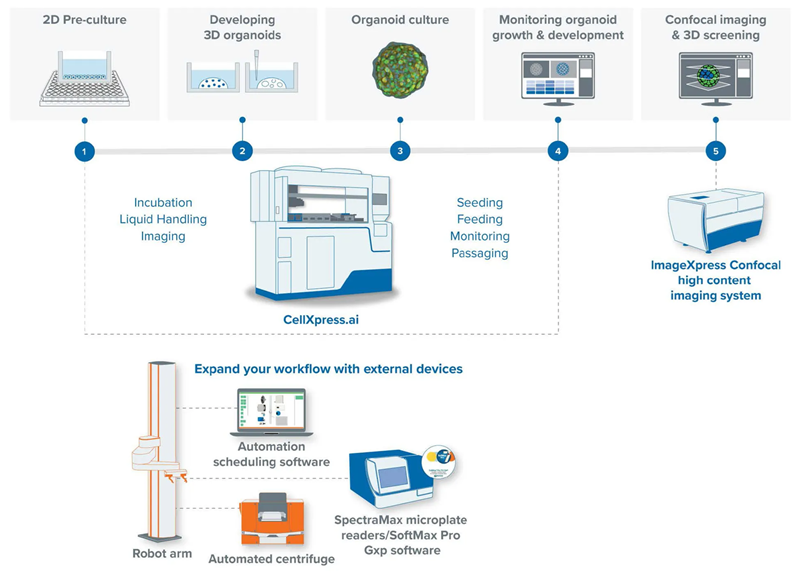
Image Credit: Molecular Devices UK Ltd
Applications
Applications of the CellXpress.ai automated cell culture system
The CellXpress.ai™ technology improves cell culture and assay processes by solving standardized, reproducible, and scalable problems. The system automates important procedures for the following applications:
- 3D organoid assays
- 3D spheroid assays
- Automated cell culture
- Intestinal organoids
- iPSC-derived culture
3D organoid assays
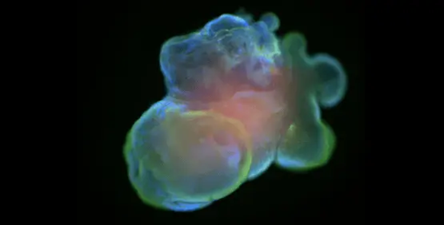
Image Credit: Molecular Devices UK Ltd
The CellXpress.ai™ Automated Cell Culture System enables automated organoid assay methods. This novel approach tackles the issues of uniformity, repeatability, and scalability in 3D organoid culture and analysis. By combining powerful hardware and software, including machine learning-based image analysis, the system automates crucial procedures, including media exchange, passaging, and endpoint testing.
The studies and methods described demonstrate the successful automation of processes for iPSC, tumoroid, and adult stem cell-derived organoids, resulting in increased throughput, consistency, and reliability. These improvements indicate automation's potential to transform organoid research, making it more efficient and scalable for drug discovery and customized medicine applications.
- Automate 3D organoid culture and analysis to convert the difficulties of 3D cell culture into a reliable and translatable science
- CellXpress.AI Automated Cell Culture System: An automated workstation for repeatable organoid production
- Automation of 3D organoid cultivation and tests using machine learning and advanced image analysis
3D spheroid assays
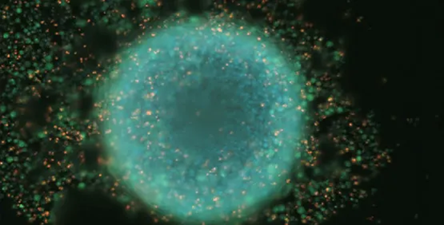
Image Credit: Molecular Devices UK Ltd
Comprehensive drug efficacy testing procedures are required to discover effective drug combinations for cancer therapy. 3D cancer models, such as spheroids and toroids, are invaluable for cancer research and treatment development because they can precisely replicate tumor form and behavior. However, the intricacy and manual nature of 3D assays have limited their widespread use in high-throughput drug screening.
The CellXpress.ai Automated Cell Culture System overcomes these obstacles by completely automating 3D spheroid assays such as plating, passaging, media exchanges, organoid monitoring, chemical dosing, and endpoint assays. This automation improves the scalability, consistency, and efficiency of complicated 3D cell-based assays, accelerating the discovery of new therapeutic targets and drug combinations.
- Automation of the entire workflow for 3D cancer spheroid experiments using CellXpress.ai
- Cell culture automation of the 3D cancer spheroid experiment using the CellXpress.ai cell culture system
Automated cell culture
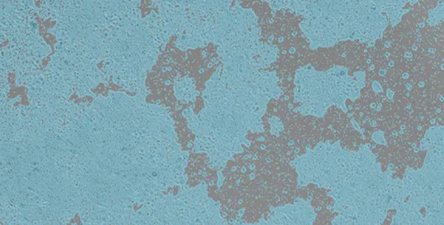
Image Credit: Molecular Devices UK Ltd
The CellXpress.ai Automated Cell Culture System’s novel use of decision-making-based picture analysis transforms cell culture maintenance and expansion. The device combines liquid handling, incubation, imaging, and AI-powered software to carry out complex cell culture processes with minimal human intervention.
The decision-making capabilities, powered by real-time image analysis, allow the system to monitor cell growth and automatically initiate actions such as media exchanges and cell passaging. This innovative strategy improves workflow efficiency and consistency, and significantly minimizes researchers' manual workload and error possibility.
- Fully automated cell culture passaging and expansion using decision-making-based image analysis
- Utilizing AI to automate cell culture
- How AI-powered cell culture can revolutionize drug discovery
- CellXpress.ai AI-powered Software
Intestinal organoids
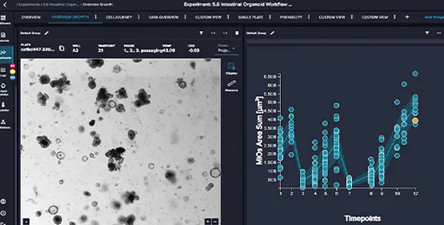
Image Credit: Molecular Devices UK Ltd
Since intestinal organoids can replicate human intestines' physiological structure and function, they are essential for improving drug discovery and disease modeling. The CellXpress.ai Automated Cell Culture System is an example of a solution that tackles the issues of assay complexity, repeatability, and scalability that have prevented organoid-based screening techniques from being widely used.
The CellXpress.ai system automates the whole 3D intestinal organoid culture process, including media exchange, plating, passaging, organoid monitoring, and endpoint assays.
This automation significantly boosts the number of organoid cultures that can be processed simultaneously, guarantees process uniformity, and enhances the accuracy of the outcomes. These improvements make reliable toxicity testing and effective high-throughput drug discovery possible.
This solution helps researchers overcome conventional obstacles and greatly increase productivity in drug development and precision medicine applications by utilizing machine learning and AI-powered image analysis to provide dependable and reproducible outcomes.
- Using healthy intestinal organoids, automated testing for the effects of compound toxicity
- Automation of 3D intestinal organoids culture with the CellXpress.ai Automated Cell Culture System
iPSC-derived culture

Image Credit: Molecular Devices UK Ltd
Induced pluripotent stem cells (iPSCs) are essential for producing various cell types, organoids, and tissues, as well as establishing disease-specific phenotypes by CRISPR genetic editing. However, the manual methods used in iPSC cultures are labor-intensive and stressful. The CellXpress.ai Automated Cell Culture System controls the whole iPSC culture process, including passaging, medium exchange, monitoring, and cell expansion.
The system combines an incubator, a liquid handler, and AI-powered, image-based decision-making to manage feeding schedules, monitor cell growth, and take appropriate action. By automating these methods, the CellXpress.ai system improves scalability, reproducibility, and efficiency for high-throughput drug discovery and disease modeling.
- Automation of iPSC culture, passaging, and expansion using CellXpress.ai Automated Cell Culture System
Specifications and options
Specifications and options of CellXpress.ai automated cell culture system
CellXpress.ai cell culture system features and options
Source: Molecular Devices UK Ltd
| Incubator |
| Capacity (choose) |
44 plate max – 2 rack capacity
154 plate max – 7 rack capacity |
| Decontamination |
Automated hydrogen peroxide decontamination |
| Environmental control |
CO2, temperature, and humidity control |
| Imager |
| Objectives |
2X through 40X objectives available |
| Imaging modes |
TL and up to 6 FL channels |
| Acquisition mode |
Time lapse, Z-stack, optional Digital Confocal* |
| LED light source |
7 LEDs ranging from 365 to 730 nm |
| Available filter cubes |
DAPI, FITC, TRITC, TxRed, Cy5, Cy7, CFP, YFP |
| Environmental control |
Temperature and CO2 control |
| Camera |
24 megapixel camera |
| Acquisition speed |
Rapid whole plate acquisition |
| Liquid handler |
| Pipette head |
Span 8 |
| Deck locations |
9 positions: plate cooling, heating, and tilting |
| Cell culture media |
Heated and cooled positions for low-volume and bulk media |
| Decontamination |
Automated on-deck UV decontamination |
| Waste |
| Liquid waste |
10 L liquid waste capacity with volume tracking |
| Solid waste |
60 L solid waste capacity with automated lid |
| System |
| Transfer ports |
2 plate transfer ports |
| Enclosure |
HEPA filtered with anti-clog sensor |
| On-system display |
15” touchscreen display |
| External workstation |
10 Tb workstation with 27” LED monitor |
| Size |
2250 mm W x 954 mm D x 2,155 mm H |
| Weight |
1,042 kg / 1,100 kg |
| Power consumption |
2000 W max, 2ea 10A lines |
| Certifications |
CSA, CE |
| Software |
| Cell culture protocol manager |
Pre-defined and user-defined protocols |
| Experiment manager |
At-a-glance experiment manager |
| Cell journey |
Phase-based cell journey with film-strip viewer |
| Decision making |
Rule-based decision making to advance and stop cell culture |
| System dashboard |
At-a-glance dashboard informs the user of immediate or upcoming actions needed |
| User alerts |
Configurable alerts keep the user informed about the state of the cell culture |
*CellXpress.ai cell culture system uses AutoQuant 2D Real Time Deconvolution